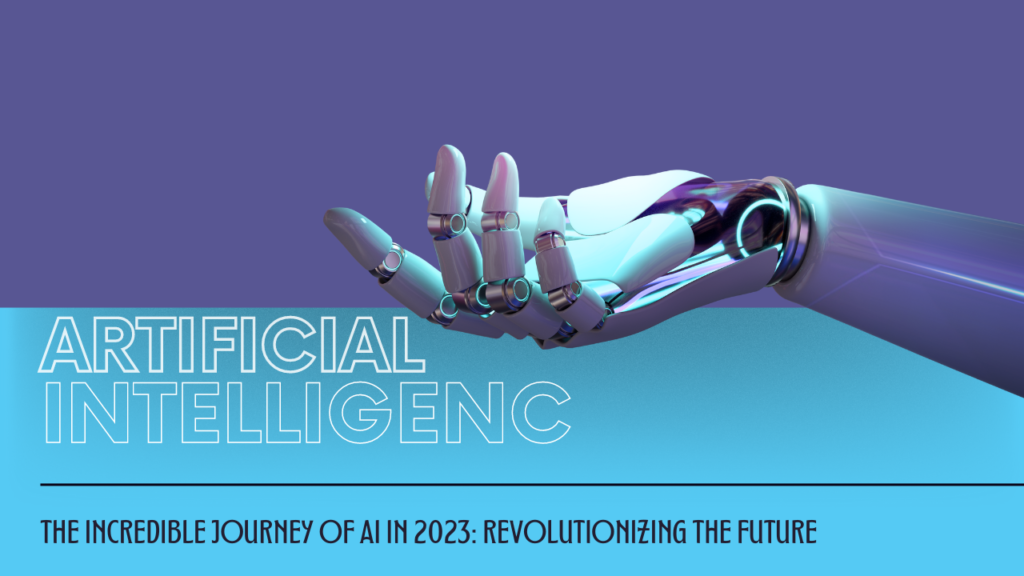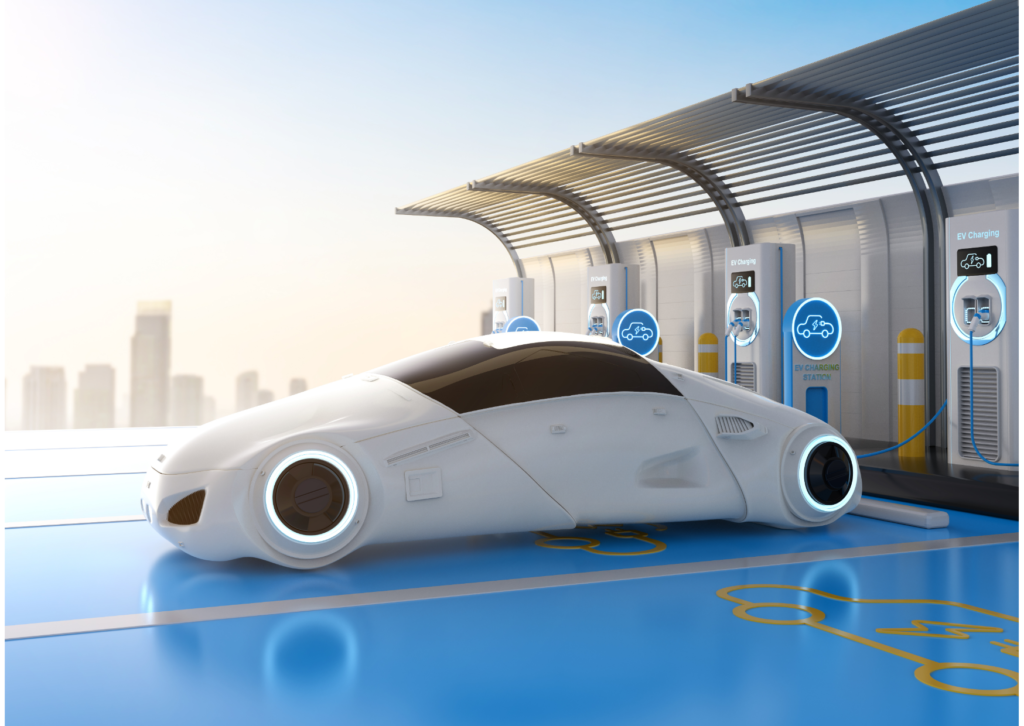The Incredible Journey of AI in 2023: Revolutionizing the Future

The Journey of AI has already begun to revolutionize the world in various ways, and its impact is expected to grow even further in the coming years. This evolving technology is like a chameleon, blending and infusing into various sectors and transforming them completely. With this post, let’s unravel the enigmatic world of AI and understand how it is pushing the boundaries of innovation and reshaping the business landscape. Artificial Intelligence or AI, in simple terms, is the capacity of a machine to mimic cognitive human abilities. It’s fascinating to note that AI has invisibly interweaved into our daily lives, powering our digital assistants like Alexa or Siri or tailoring our streaming preferences on Netflix.
At its core, AI is defined as the capability of a machine to emulate cognitive human functions. Such a simplified definition, however, hardly captures the true essence of this intricate and powerful technology. AI is much more than a mere mimic of human intellect; it is a revolutionary force capable of enhancing and even surpassing human capacities in many respects.
One of the intriguing aspects of AI is its quiet yet profound integration into our everyday lives. Today, AI powers our voice-activated digital assistants like Amazon’s Alexa and Apple’s Siri, turning science fiction into reality by responding intelligently to our queries, managing our schedules, controlling our smart homes, and even amusing us with jokes.
In the coming years, the impact of AI is expected to grow even further. With advances in machine learning, neural networks, and deep learning, AI’s capabilities are continuously expanding, opening up unprecedented possibilities. It is poised to revolutionize industries, economies, and societies, disrupting the status quo and creating a new world order.
Here are some key areas where AI is making a significant difference:
AI-driven Automation:
Artificial Intelligence (AI) technology provides a platform for the automation of tasks that were initially accomplished manually. This shift enhances the overall efficiency, productivity, and accuracy across various industries. For instance, in the manufacturing sector, AI-driven robots can successfully undertake complex assembly tasks, which leads to amplified production rates and lowered expenditure.
AI’s versatility allows it to automate complex processes such as data analysis, prediction modeling, customer service, and even intricate surgical procedures. In the financial industry, AI algorithms are employed to analyze market trends and provide insights, facilitating automated trading. In the healthcare sector, AI can automate patient diagnosis through the analysis of patient symptoms and medical records, thereby reducing the workload on healthcare professionals.
Moreover, AI-driven automation extends to everyday tasks, making life more convenient. For example, AI-powered virtual assistants, such as Siri or Alexa, automate routine tasks such as setting alarms, making calls, or managing calendars. In homes, AI-powered systems automate tasks like adjusting lighting, controlling temperature, and managing security.

Furthermore, the journey of AI in automation has introduced a new phase of industrial revolution, often termed as Industry 4.0. It integrates cyber-physical systems, IoT, and cloud computing, leading to smart factories where machinery and equipment can improve processes through self-optimization and automation.
AI technologies enable the automation of tasks that were previously performed by humans. This improves efficiency, productivity, and accuracy across industries. For example, robots powered by AI can perform complex assembly tasks in manufacturing, leading to increased production rates and reduced costs.
AI’s Potential to Revolutionize Healthcare:
Artificial Intelligence holds immense potential to revolutionize the healthcare industry by enhancing diagnostics, treatment planning, and patient care. AI algorithms can accurately analyze medical images, such as X-rays and MRIs, assisting in the early detection of diseases, including cancer, Alzheimer’s, and heart ailments.

AI has the potential to revolutionize healthcare by improving diagnostics, treatment planning, and patient care. AI algorithms can analyze medical images, such as X-rays and MRIs, to aid in the early detection of diseases. AI-powered chatbots and virtual assistants can provide personalized healthcare recommendations and support to patients.
AI-powered chatbots and virtual assistants play an instrumental role in personalizing healthcare recommendations. They can provide health advice, monitor patient health, remind patients to take medication, and even provide emotional support, thereby making healthcare more accessible and affordable. The journey AI will be applied in healthcare and also extends to predictive analysis. For example, they can predict disease outbreaks or patient deterioration based on patterns in health data. In precision medicine, AI can analyze patient genetics, lifestyle, and other factors to tailor treatment plans for individual patients
AI is also revolutionizing telemedicine, enabling remote patient monitoring and virtual consultations. In the midst of a global pandemic, AI’s ability to facilitate remote healthcare has proven invaluable.
Impact of AI on Transportation:
AI is driving innovation in the transportation sector. Self-driving cars, enabled by AI and machine learning, have the potential to enhance road safety, reduce traffic congestion, and provide greater mobility for individuals who cannot drive. AI algorithms also optimize logistics and route planning, leading to more efficient transportation systems.
AI also finds its application in optimizing logistics and route planning for commercial vehicles, ensuring more efficient transportation systems. This results in reduced fuel consumption, delivery times, and operational costs, thereby fostering sustainable transportation practices.

AI’s role extends to public transportation systems too. Through AI, public transportation systems can be optimized based on demand, reducing overcrowding and improving service. It can also help in predictive maintenance of vehicles, preventing breakdowns and ensuring reliable service.
Moreover, the journey of AI is pivotal in the aviation industry. AI algorithms help in flight planning, predicting weather conditions, ensuring safety standards, and even automating pilot tasks.
Furthermore, AI has facilitated the development of innovative transportation concepts, such as hyperloop and drone taxis, which could potentially revolutionize the future of transportation.
AI’s Analyses for Personalized Services:
Artificial Intelligence (AI) algorithms are sophisticated data-crunching machines that can analyze vast amounts of user data to deliver personalized recommendations and services. Online platforms, like streaming services, e-commerce websites, social media networks, and even educational platforms, utilize AI to suggest content, products, or services that are tailored to individual preferences. This has brought about a significant improvement in user experiences and has significantly enhanced customer satisfaction.
One of the most prominent uses of AI in personalized services is seen in the realm of content streaming. Companies like Netflix and Spotify use AI to analyze user behavior, preferences, and engagement patterns to recommend movies, TV shows, and music that the user might enjoy. By understanding and learning from users’ viewing or listening history, AI algorithms can curate personalized content recommendations that cater to each user’s unique taste. This dynamic personalization system keeps users engaged, as they continually discover new content that aligns with their interests.
E-commerce platforms also utilize AI for personalization to great effect. Giants like Amazon and Alibaba employ sophisticated AI algorithms that track users’ browsing and purchasing history, click patterns, and even the time they spend on each product. By doing so, they can offer personalized product recommendations that are likely to pique the user’s interest. This level of personalization improves the shopping experience, boosts customer engagement, and ultimately drives sales.
Crucial Role of AI Strengthening Cybersecurity:
In an era where technology continues to advance at an unprecedented rate, cyber threats have also evolved, becoming more sophisticated and dangerous. AI plays a crucial role in detecting and mitigating such threats. Through its ability to analyze network traffic patterns, identify anomalies, and respond to potential security breaches in real time, AI significantly strengthens cybersecurity measures.
AI-powered cybersecurity solutions work by learning the normal behavior of a system, network, or user, and then continuously monitoring for deviations from this norm. When an anomaly is detected, the AI system can alert human analysts or even take pre-defined actions to mitigate the threat. This proactive approach to cybersecurity significantly reduces the time between the onset of a cyber attack and its detection, thereby reducing potential damage.
Furthermore, AI’s ability to analyze vast amounts of data quickly and accurately makes it an invaluable tool in threat hunting. Cybersecurity analysts can use AI to sift through logs and alerts to identify signs of a potential threat. This enables them to proactively identify and neutralize threats before they cause harm.
AI’s Transformation Towards Education:
Artificial Intelligence (AI) has the potential to revolutionize the education sector. It can create personalized learning experiences, adapt teaching methods to individual students’ needs, and provide tailored feedback. AI can also automate administrative tasks for educators, freeing them to focus more on teaching.
Personalized learning experiences are a key area where AI can make a significant impact. AI algorithms can analyze a student’s performance, learning speed, and preferred learning style to tailor educational content to their needs. This means that students can learn at their own pace and in a way that suits them best, resulting in a more engaging and effective learning experience. Companies such as Knewton and DreamBox are using AI to create adaptive learning platforms that adjust to each student’s unique needs.

AI can also provide real-time feedback to students, helping them to understand their strengths and areas for improvement. AI-powered systems can assess student work, provide suggestions for improvement, and even predict future performance based on past results. This immediate feedback helps students to understand and correct their mistakes quickly, thereby enhancing their learning process.
Furthermore, AI has the potential to improve accessibility in education. AI-powered tools can help students with special needs by providing customized resources and support. For instance, AI can convert text to speech for visually impaired students, or offer personalized learning aids for students with learning difficulties.
Beyond personalized learning, AI can automate administrative tasks, which often take up a significant portion of educators’ time. These tasks can include scheduling, attendance tracking, grading, and providing feedback. By automating these tasks, AI frees educators to focus more on teaching and less on administration.
While the potential journey of AI in education are significant, it’s important to be mindful of the challenges. These include data privacy concerns, the risk of over-reliance on technology in teaching, and the need for human interaction in education. Despite these challenges, with careful implementation and regulation, AI has the potential to transform education for the better.
AI for Environmental Solutions:
Artificial Intelligence (AI) technologies can significantly contribute to addressing environmental challenges. They can optimize energy consumption, improve predictions of natural disasters, facilitate the development of renewable energy systems, and play a role in monitoring and managing ecosystems, aiding conservation efforts.
AI can optimize energy consumption by predicting demand and adjusting supply accordingly. For instance, Google uses AI to optimize the energy efficiency of its data centers. By analyzing data from various sensors and using machine learning to understand the complex relationships between different variables, Google’s AI system has achieved a 40% reduction in energy used for cooling and a 15% reduction in overall energy overhead.
AI also has a critical role in predicting natural disasters. By analyzing weather data and using machine learning algorithms, AI can accurately predict the occurrence of natural disasters such as hurricanes, earthquakes, and floods. This early warning can help authorities to prepare and respond more effectively, potentially saving lives and reducing damage.
Furthermore, AI can facilitate the development of renewable energy systems. AI algorithms can optimize the operation of wind turbines, solar panels, and other renewable energy sources. For example, DeepMind, a Google subsidiary, developed an AI system that predicts the wind output from wind farms 36 hours in advance. This allows the energy produced to be optimally scheduled into the grid, thereby reducing energy wastage.
AI also plays a significant role in monitoring and managing ecosystems. AI-powered drones and satellites can monitor deforestation, track wildlife populations, and detect illegal fishing activities. This real-time monitoring can help conservationists to protect endangered species and preserve natural habitats.
The journey of AI continues to unfold, with ongoing advancements and innovations pushing the boundaries of what is possible. As AI technologies become more sophisticated, they have the potential to revolutionize additional sectors such as finance, agriculture, entertainment, and more. It’s important to note that while AI brings numerous benefits, there are also ethical considerations that need to be addressed, such as privacy concerns, bias in algorithms, and the impact on employment. The widespread adoption of AI also fuels interdisciplinary research and collaboration, leading to new breakthroughs and discoveries.
With responsible development and ethical considerations at the forefront, AI’s journey promises a future of boundless possibilities and transformative impact. Striking a balance between technological advancements and societal well-being is essential for the responsible and beneficial integration of AI into our lives.
In conclusion, the journey of AI is an ongoing saga of revolutionary change and limitless possibilities. It is a fascinating exploration of how machines are learning to think, learn, adapt, and perhaps even understand. As we stand on the brink of this brave new world, let’s appreciate the far-reaching impact of AI, and prepare ourselves for a future where AI is not just a tool, but a way of life.
Looking for more tech-related content, feel free to visit here. To read more about the impacts of AI in future world read this article


